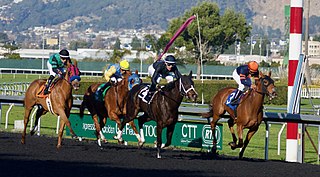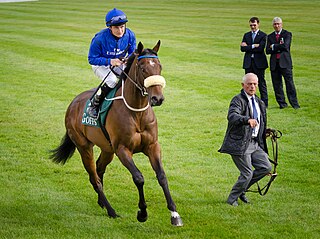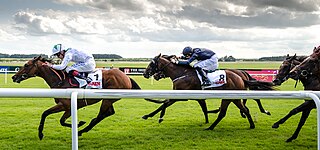Related Research Articles

Thoroughbred racing is a sport and industry involving the racing of Thoroughbred horses. It is governed by different national bodies. There are two forms of the sport – flat racing and jump racing, the latter known as National Hunt racing in the UK and steeplechasing in the US. Jump racing can be further divided into hurdling and steeplechasing.

Horse racing is an equestrian performance activity, typically involving two or more horses ridden by jockeys over a set distance for competition. It is one of the most ancient of all sports, as its basic premise – to identify which of two or more horses is the fastest over a set course or distance – has been mostly unchanged since at least classical antiquity.

Horse racing is the second largest spectator sport in Great Britain, and one of the longest established, with a history dating back many centuries. According to a report by the British Horseracing Authority it generates £3.39 billion total direct and indirect expenditure in the British economy, of which £1.05 billion is from core racing industry expenditure, and the major horse racing events such as Royal Ascot and Cheltenham Festival are important dates in the British and international sporting and society calendar.

The Jockey Club is the largest commercial horse racing organisation in the United Kingdom. It owns 15 of Britain's famous racecourses, including Aintree, Cheltenham, Epsom Downs and both the Rowley Mile and July Course in Newmarket, amongst other horse racing assets such as the National Stud, and the property and land management company, Jockey Club Estates. The registered charity Racing Welfare is also a company limited by guarantee with the Jockey Club being the sole member. As it is governed by Royal Charter, all profits it makes are reinvested back into the sport.

Godolphin is the Maktoum family's private Thoroughbred horseracing stable and was named in honour of the Godolphin Arabian, who came from the desert to become one of the three founding stallions of the modern Thoroughbred. Godolphin is buried at Wandlebury Park in Cambridge, where there is a stone to commemorate this horse in the passageway of the old buildings.
The Longines World's Best Racehorse Rankings (LWBRR), known as World Thoroughbred Racehorse Rankings (WTRR) before 2012, are horseracing's equivalent to World Rankings by other major sporting organizations such as ATP Tennis Rankings, World Golf Rankings, FIFA World Rankings for soccer and IRB Rugby World Rankings. The Longines Rankings are based on the rating earned by horses running worldwide from North and South America, Europe, Middle East, South Africa, Asia through to Australia and New Zealand.

The National Horseracing Authority of Southern Africa, known as the National Horseracing Authority for short, formerly the Jockey Club of Southern Africa is the Southern African equivalent of the American and British Jockey Clubs, whose main purposes are to prevent malpractice in horse racing and to regulate the thoroughbred horse racing industry in Southern Africa.
Relko (1960–1982) was a French Thoroughbred racehorse and sire. In a racing career which lasted from 1962 until 1964 he ran thirteen times and won nine races. His most notable win came in the 1963 Derby.

Going (UK), track condition (US) or track rating (AUS) are the track surface of a horse racing track prior to a horse race or race meet. The going is determined by the amount of moisture in the ground and is assessed by an official steward on the day of the race.
Equine drug testing is a form of drug testing applied to performance horses in regulated competition. Most common in racehorses, drug tests are also performed on horses in endurance riding and in international competition such as the Olympics and FEI-sanctioned competition. Many horses in a competition sanctioned by various national organizations, such as the United States Equestrian Federation in the USA are also tested for improper drug use. An organization for cooperation and harmonization regarding horseracing is the International Federation of Horseracing Authorities (IFHA) that have several members in over 50 countries worldwide.
Gordon Elliott is a County Meath-based National Hunt racehorse trainer. After riding as an amateur jockey, he took out a trainer's licence in 2006. He was 29 when his first Grand National entry, the 33 to 1 outsider Silver Birch, won the 2007 race. In 2018 and 2019 he won the Grand National with Tiger Roll, ridden by Davy Russell and owned by Gigginstown House Stud, the first horse since Red Rum to win the race twice. In 2018 he also won the Irish Grand National, with General Principle. On two occasions, in 2017 and 2018, he was the top trainer at the Cheltenham Festival.
The Ballysax Stakes is a Group 3 flat horse race in Ireland open to three-year-old thoroughbreds. It is run over a distance of 1 mile and 2 furlongs (2,012 metres) at Leopardstown in April.
The Turf Club was the regulatory body for horse racing in Ireland until 31 December 2017.

Encke was an American-bred, British-trained Thoroughbred racehorse, best known for winning the classic St Leger Stakes at Doncaster Racecourse on 15 September 2012 when he defeated the Triple Crown bid of Camelot. In spring of 2013 Encke was banned from racing after failing a drug test. He returned to racing in 2014 and was placed in three races including the Irish St. Leger. He sustained a fatal injury in training in October 2014.
Mahmood Al Zarooni is an Emirati horse-racing trainer at the Godolphin horse-racing operation along with Saeed bin Suroor. He was born in Dubai, and became trainer on 24 March 2010, before the Dubai World Cup meeting. His first winner was Calming Influence, who won the Godolphin Mile.

Luke and Brian Comer are Irish billionaire property developers and the founders and owners of the Comer Group, a privately owned UK property development company.

Horse racing in Ireland is intricately linked with Irish culture and society. The racing of horses has a long history on the island, being mentioned in some of the earliest texts. Domestically, racing is one of Ireland's most popular spectator sports, while on the international scene, Ireland is one of the strongest producers and trainers of Thoroughbred horses. The Irish horse racing industry is closely linked with that of Great Britain, with Irish horses regularly competing and winning on the British racing circuit.

O'Connell & anor v The Turf Club, [2015] IESC 57, [2017] 2 IR 43 is an Irish Supreme Court case which explored the scope of judicial review in Ireland. It addressed whether the decisions of a sport's organizing body should be amenable to judicial review. In deciding that it was, this decision became a useful reminder that it is not only bodies created by statute, which are generally considered to be subject to public law, that are amenable to Judicial Review by the Courts.
IHRB may refer to:
Graham Bradley was a professional horse racer and a member of the National Hunt Jockey Club. On November 29, 2002 he was banned from the Club for breaking six of its rules.
References
- ↑ O'Connor, Brian (27 October 2017). "New Irish horse racing regulatory board to start in 2018". Irish Times .
- ↑ "HRB Opening Statement Public Accounts Committee". IHRB. 29 June 2024.
- 1 2 O'Connor, Brian (29 June 2023). "IHRB thrown into disarray by 'bombshell' revelation of 'grave financial concern'". The Irish Times.
- ↑ "Governance". IHRB. Retrieved 10 July 2024.
- ↑ "Gordon Elliott handed one-year training ban over dead horse photograph". The Guardian . 5 March 2024.
- ↑ "Luke Comer: Irish trainer banned for three years over steroids in horses". BBC Sport . 14 September 2023.
- ↑ "Luke Comer's appeal against three-year ban after major doping scandal is dismissed". Racing Post . 27 June 2024.
- ↑ "IHRB chief financial officer resigns after a year of voluntary leave following revelation of financial issue of 'grave concern'". Racing Post. 9 July 2024.